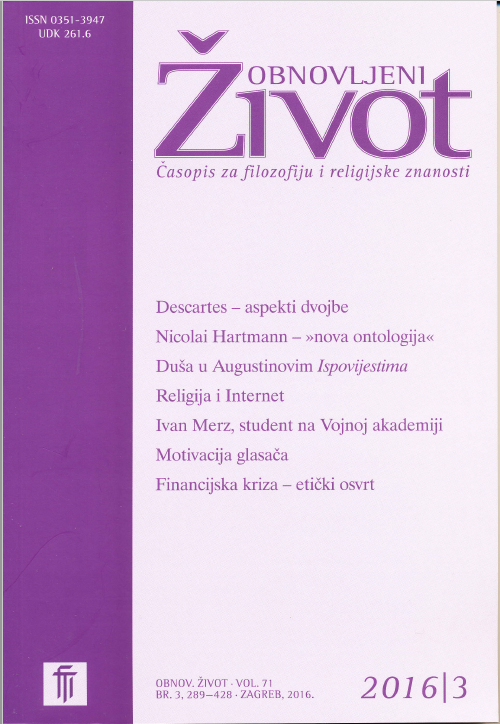The Soul in Augustine’s Confessions with Special Reference to the Problem of Establishing a (Non–) Correspondence with Freud’s Concept of Psychoanalysis
Keywords:
Augustine, Freud, soul, psychoanalysis, man, personality, psychologyAbstract
In the content of this essay, which was methodologically envisioned as an interdisciplinary (philosophical and theological) reflection on the soul, and which (essay) epistemologically relies on cognitive–theoretical sources of two, in the opinion of the author, of the foremost authorities on the concept of soul: the philosopher, theologian, Christian scholar and bishop , from Tagaste by birth — St. Aurelius Augustine and the contemporary Austrian psychologist, »the father of psychoanalysis« and pioneer in the sphere of the unconsious — Sigmund Freud we wish to examine convergences and divergences in regard to their concepts of soul. The essay aims to answer the following: 1 ) in what way does Augustine understand the concept of soul, what is his starting point and wherein is his understanding of soul founded? 2) in what measure and in what way is/was his teaching on soul, as expounded in his Confessions, reflected in Freud’s explanation of soul, understood by the latter as the locus primus in the study of causes and effects of neuropathological phenomena in clinical practice as described in detail and elucidated in his Introduction to Psychoanalysis? The essay is structured as follows: the first section aims, from the theological and cognitive aspects, to examine the basic tenets of Augustine’s understanding and explanation of soul, but in the spirit of Fichte’s qualis homo, talis philosophia. The second section of the essay focuses on the author’s interpretation of Freud’s psychoanalysis as a therapeutic method by means of which man’s »sick soul« or rather »personality « according to Freud, is not only studied but healed (Allport). The content of the third section deals with the convergences and divergences of Augustine’s and Freud’s »theo–psychoanthropology«, for that which is common to Augustine and Freud is the focus of their research, and that is man : for Augustine, exploring (revealing) the soul is the path to seeking (discovering) God such that we are dealing with a psychology which issues from ascendent theology and , on the other hand, exploring (revealing) of the unconscious part of Aristotle’s »reasonable souls« in the Freudian manner is the path to exposing man’s personal identity (selfhood) : man is the starting point in the search for God (i.e. the source of good), but of the self also (St. Augustine, Ch. Taylor).
Downloads
Published
Issue
Section
License
Jednom prihvaćeni članak obvezuje autora da ga ne smije objaviti drugdje bez dozvole uredništva, a i tada samo uz bilješku da je objavljen prvi put u Obnovljenom životu. Uredništvo će obavijestiti autora o prihvaćanju ili neprihvaćanju članka za objavljivanje.
Članci objavljeni u časopisu se, uz prikladno navođenje izvora, smiju besplatno koristiti u obrazovne i druge nekomercijalne svrhe.


